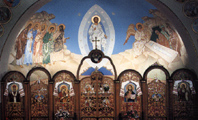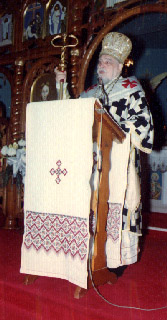 There are a half
dozen or so Ukrainian Catholic
parishes in the city of Montreal. St. Michael's was the first
Ukrainian
Catholic Church, the "mother parish," in Montreal. Here, many
Ukrainians
first worshiped, were baptized or married, or given final respects.
There are a half
dozen or so Ukrainian Catholic
parishes in the city of Montreal. St. Michael's was the first
Ukrainian
Catholic Church, the "mother parish," in Montreal. Here, many
Ukrainians
first worshiped, were baptized or married, or given final respects.
St. Michael's past is a memorable one to many of its elderly parishioners. It was not without its great moments, or its sad ones.
Its history can be traced back to the arrival in Montreal of the first Ukrainian immigrants, back in 1899. Of solid peasant stock, they had come to Canada seeking better lives. Many took jobs as factory workers.
The first Mass in their Rite was celebrated three years later, in October 1902, by a visiting Basilican Priest, in an Oblate-run church in the vicinity of the present parish.
For many years, visiting priests were their only formal connection with the Rite. Many of these priests were travelers from the Metropolitan See of Winnipeg, passing through Montreal on their way to Europe. Records show that one of these priests was a French Canadian, one Fr. Sabourin, who had transferred into the Eastern Rite.
Various parishes were used for services during this period, including St. Anne's, St. Eusebe, and St. Charles' parishes.
It was not until September 1910 that things were set in motion to build a church. The prime instigator of the move was the "Servant of God" Metropolitan Andriy Sheptytsky, visiting Montreal to take part in a Eucharistic Congress. (Sheptytsky was later martyred years later by the Soviets).
The first regular pastor for the Ukrainians in the area was appointed in 1911. From then on, the liturgy was celebrated regularly in the Franciscan church of St. Anthony of Padua, on Lagauchetiere and Plessis streets.
The property for the present parish complex was purchased in 1912. The pastor at the time was Fr. Desmarais, another French Canadian.
Then came the War, and tragedy struck the little community. Since much of the Ukrainian territory was then under Austrian domination (Ukraine has been subjugated by one country or another for much of its turbulent history; rarely had it been autonomous) Canada incarcerated many Ukrainians in detention camps at Petawawa and Crystal Lake, Quebec.
In April, 1916 the incumbent pastor called a mass meeting at which it was decided to construct a house of worship measuring 85 X 90 feet. Because of the war, his plans for a beautiful edifice were not realized, and only a basement church was built.
Its cornerstone was blessed by Bishop Nicetas Budka (an other martyr at the hands of Communists), the first Ukrainian Catholic bishop of Canada. The church opened its doors on Easter Sunday, 1917.
In 1930, construction work on the parish hall, now newly renovated, was completed.
In 1954, the old basement church was razed, and the present edifice was built on the old foundations, under the supervision of the late Fr. Kushniryk.
The building sports Byzantine towers, and is of Byzantine style within. At the front, separating the main part, a magnificent nine foot high iconostasis or icon-stand, of sculptured pear wood and polished walnut it bears the prescribed icons of Christ the Teacher, the Blessed Mother, St. Nicholas, the four Evangelists, and the patron saint of St. Michael the Archangel.
Its motif is a grapevine, which makes the iconostasis unique, in so much as the congregation can see through the openings in the structure into the sanctuary.
There are no statues. Instead, Byzantine style icons and murals, bearing likeness of the saints and of the Ukrainian kings, princes and
 ecclesiastics,
grace the walls and ceiling. Also
depicted are scenes from the lives of Our Lord and Our Lady. On
the
east wall lies a huge mural portraying the Martyred Ukrainian
Episcopate.
The mural includes likeness of Metropolitan Sheptitsky, and Bishop
Budka,
both of whom have figured in the history of the parish.
ecclesiastics,
grace the walls and ceiling. Also
depicted are scenes from the lives of Our Lord and Our Lady. On
the
east wall lies a huge mural portraying the Martyred Ukrainian
Episcopate.
The mural includes likeness of Metropolitan Sheptitsky, and Bishop
Budka,
both of whom have figured in the history of the parish.
St. Michael's is a relatively modern Byzantine edifice. Yet it looks different from other churches in Montreal, be they contemporary or not, and that is because it is different.
It was conceived to service the needs of people from a different culture, whose spiritual upbringing would be unfamiliar to other Catholics. Their upbringing is as far removed from traditional Catholic formation as a different church language and centuries of separation from Rome, now ended, can have made it.
And yet, St. Michael's continues to fulfill a necessary function to Montrealers of Ukrainian descent, and provides opportunity for others to see how one distinctive segment of the Catholic Church fulfills its obligation to God and to man.